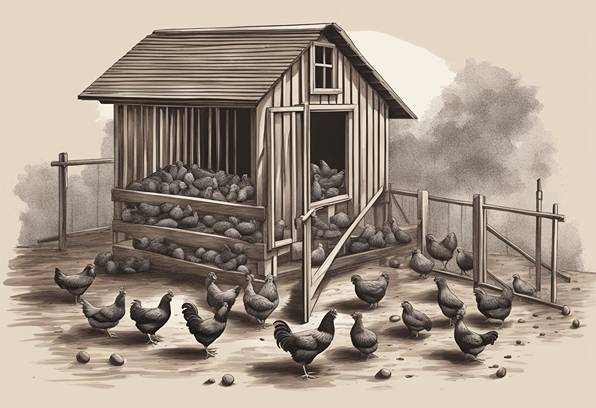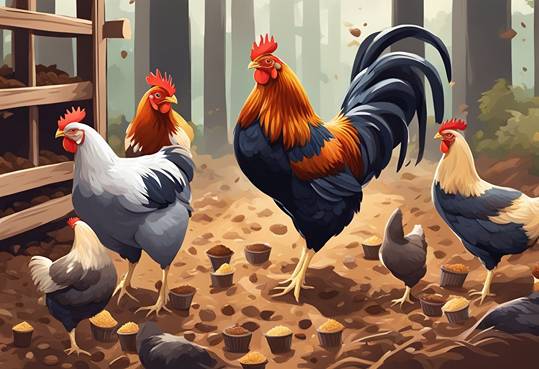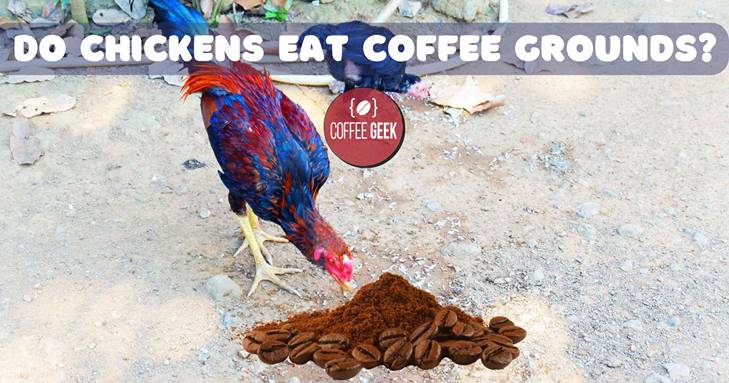Many chicken keepers wonder if chickens can eat coffee grounds, and if so, are there any benefits or risks involved?
Chickens have specific dietary needs, which should always be considered when deciding to offer them any new type of food. Do chickens eat coffee grounds?
Coffee grounds are a common byproduct of daily coffee consumption, and though they may seem like an ideal treat for chickens, it is essential to research and understand how they may affect your birds.

Coffee grounds can be a divisive topic when it comes to chickens, with some keepers swearing by their benefits, while others warn of potential hazards.
Knowing the effects of coffee grounds on chickens, as well as proper ways to include them in their diet or environment, can help you decide whether or not it’s a good idea to let your birds snack on these leftovers.
Key Takeaways
- Chickens can eat coffee grounds in moderation, but it’s important to consider their dietary needs and potential hazards.
- Coffee grounds can provide benefits like pest deterrence and added nutrients while also posing risks like acidity and high caffeine content.
- Understanding how to incorporate coffee grounds safely in a chicken’s diet or environment is essential for their well-being.
- Understanding Chickens' Dietary Needs
- Do Chickens Eat Coffee Grounds?
- Incorporating Coffee Grounds into a Chicken's Lifestyle
- Benefits and Hazards of Coffee Grounds for Chickens
- The Role of Coffee Grounds in Chicken Coops
- Dealing with Chicken Health and Coffee Grounds
- Alternative Uses for Coffee Grounds in Chicken Care
- Conclusion
- Frequently Asked Questions
Understanding Chickens’ Dietary Needs

Nutrition and Balanced Diet
Knowing how to properly feed your chickens is essential to keep them healthy and productive.
Chickens require a balanced diet consisting of carbohydrates, proteins, fats, vitamins, and minerals.
These elements play a vital role in their overall well-being and energy levels.
Carbohydrates provide energy for daily activities, while proteins help in the growth and repair of muscles and tissues.
Fats are crucial for maintaining optimal health, and vitamins and minerals support various bodily functions.
It’s important to provide a diverse and balanced diet to your chickens to ensure they receive all these essential nutrients.
Essential Nutrients in Chicken Feed
Some key nutrients found in chicken feed include:
Protein: A crucial nutrient responsible for the growth and development of muscles, feathers, and bones. For healthy chickens, aim for a diet with around 16-18% protein content.
Calcium and Phosphorus: These minerals are necessary for strong eggshells and bone development. Calcium is also essential for the proper functioning of the nervous and respiratory systems.
Vitamins A, D, E, and K: These vitamins play a critical role in maintaining a healthy immune system, promoting good vision, and ensuring proper bone growth.
Vitamin B complex: This group of vitamins aids in the digestive system and energy production while also helping prevent stress and fatigue.
Here’s an example of some commonly found ingredients in commercial chicken feed, which provide these vital nutrients:
| Ingredient | Nutrient Provided |
|---|---|
| Cornmeal | Carbohydrates |
| Soybean Meal | Protein, B-Vitamins |
| Oats | Carbohydrates, Fiber, and Protein |
| Ground Limestone | Calcium |
| Fish Meal | Protein, Omega-3 Fatty Acids |
| Wheat Bran | Fiber |
Remember, when offering food to your chickens, it’s essential to consider their digestive system and avoid foods that could potentially be harmful, such as coffee grounds (due to their caffeine content).
By understanding your chickens’ dietary needs and providing a well-rounded diet, you’ll ensure they live a happy and healthy life.
Do Chickens Eat Coffee Grounds?

Caffeine Content and Effects
Caffeine, found in coffee grounds, is a member of the methylxanthine family.
Consuming excessive amounts of caffeine can cause toxicity in chickens and may lead to health complications such as respiratory, circulatory, and immune system issues.
Can Chickens Eat Coffee Grounds Safely?
While chickens can eat coffee grounds, it’s essential to feed them in moderation.
It is recommended to limit their coffee ground intake to no more than 10% of their daily feed ration.
Avoid giving chickens coffee grounds that have been brewed with milk or sugar, as this could potentially be harmful.
Nutritional Value of Coffee Grounds
Coffee grounds do have some potential benefits for chickens.
They are a good source of fiber and protein, and can help deter pests and bugs.
Additionally, coffee grounds can contribute extra nutrients to a chicken’s diet.
However, it’s important to note that they can be acidic and may need to be diluted before feeding to chickens.
Incorporating Coffee Grounds into a Chicken’s Lifestyle

Moderating Coffee Ground Consumption
When considering adding coffee grounds to your chickens’ diet, moderation is key.
It’s best to limit their coffee grounds intake to no more than 10% of their daily feed ration.
Since caffeine can be harmful to chickens, ensuring that the amounts are limited will keep your birds safe and healthy.
For example:
- Large chickens: 1-2 tablespoons of grounds per chicken daily
- Bantams: 1 teaspoon of grounds per bantam daily
- Chicks: Do not feed coffee grounds to baby chicks
A balanced diet is essential for your chickens, and incorporating coffee grounds into their regimen should be approached cautiously.
Proper Ways to Feed Chickens Coffee Grounds
When feeding coffee grounds to your chickens, there are several techniques to ensure they get the most benefits without being negatively affected:
Blend coffee grounds into their regular feed: To maintain a balanced diet, mix the specified amounts of coffee grounds with their daily feed.
Incorporate used coffee grounds into their bedding: This approach not only enhances their living environment with novel textures and scents but also helps repel insects and parasites. To do this, simply scatter the appropriate amount of coffee grounds in their bedding area.
Dilute with other organic matter: Since coffee grounds can be acidic, you can reduce their acidity by combining them with other coop bedding materials like wood shavings or straw.
Benefits and Hazards of Coffee Grounds for Chickens

Toxicity and Symptoms of Caffeine in Chickens
Chickens can eat coffee grounds, but it’s essential to be cautious about the amount they consume.
Excessive caffeine in their diets may lead to caffeine toxicity.
This condition affects the central nervous system and circulatory system, and can have dangerous consequences for your birds.
The common symptoms of caffeine toxicity include:
- Agitation: Chickens may show signs of agitation and increased activity.
- Rapid heart rate: Their heart rate could accelerate, causing stress to the circulatory system.
- Vomiting and panting: In severe cases, your chickens may experience vomiting and panting.
- Seizures: Chickens can also suffer from seizures as a result of caffeine toxicity.
It is crucial to carefully monitor your chickens’ coffee ground intake to prevent any health hazards.
Benefits of Coffee Grounds in a Chicken’s Diet
Despite the risks, offering coffee grounds to your chickens can also provide some benefits when given in moderation.
Here are a few advantages:
- Pest deterrence: Coffee grounds help deter pests, protecting your chickens from bugs and other annoyances.
- Extra nutrients: They contain valuable nutrients such as nitrogen, potassium, iron, and magnesium, enriching your chickens’ diets.
- Increased energy levels: A moderate serving of coffee grounds could give your chickens a mild energy boost without any side effects.
As long as you keep the caffeine intake under control, your chickens can benefit from consuming coffee grounds.
Just remember to avoid sharing grounds brewed with milk or sugar, as these additives are not suitable for their health.
The Role of Coffee Grounds in Chicken Coops

In this section, we will discuss how coffee grounds can be used in your chicken coops.
We will cover using coffee grounds as bedding and fertilizer and the effects of coffee grounds on chicken coops.
Using Coffee Grounds as Bedding and Fertilizer
Using coffee grounds in your chicken coop has multiple benefits. For one, it can be used as bedding material that helps control the smell of the coop.
The strong scent of coffee grounds can deter pests like mites, lice, and fleas which can cause discomfort and health issues for the chickens.
In addition to being used as bedding, coffee grounds can also be used as a fertilizer.
Rich in nutrients like nitrogen, potassium, iron, and magnesium, coffee grounds can benefit your gardening efforts.
Simply mix them into your compost to enrich the soil and improve your plants’ growth.
Effects of Coffee Grounds on Chicken Coops
While there are benefits to using coffee grounds in your chicken coop, some concerns should also be taken into consideration.
One such concern is the presence of caffeine in coffee grounds.
Chickens should not consume coffee grounds in excess, as it could lead to caffeine poisoning.
It is essential to monitor and limit the intake of coffee grounds to avoid such issues.
Another point to consider is that coffee grounds are acidic.
As mentioned by The Poultry Feed, you might need to dilute the coffee grounds before using them in your coop or garden to avoid any harmful effects associated with acidic substances.
Dealing with Chicken Health and Coffee Grounds

Recognizing When to Consult a Vet
As a chicken keeper, it’s essential to be aware of the potential health risks associated with feeding coffee grounds to your chickens.
While some sources suggest that coffee grounds are generally safe for chickens in moderation, they can be harmful if consumed excessively.
If you observe any of the following symptoms of caffeine toxicity in chickens, it’s time to consult a veterinarian:
- Restlessness: Chickens may become agitated or hyperactive due to the caffeine.
- Seizures: Caffeine can affect the central nervous system, leading to seizures.
- Hyperthermia: Chickens may experience an increase in body temperature.
- Respiratory issues: The respiratory system can be impacted by caffeine intake.
Caffeine’s Impact on Chickens’ Systems
Caffeine is a natural diuretic, which means it can increase urine production and potentially lead to dehydration.
It also affects the digestive system, potentially causing discomfort and reducing nutrient absorption.
To minimize the risk of caffeine toxicity in your chickens, it’s best to avoid feeding them coffee dregs or other sources of caffeine.
Instead, provide them with a balanced diet that meets their dietary needs.
Alternative Uses for Coffee Grounds in Chicken Care

Promoting Garden Health with Coffee Grounds
Used coffee grounds have a variety of benefits when it comes to gardening.
Rich in nutrients such as nitrogen, potassium, and phosphorus, they can provide a significant boost to the overall health of your garden.
By incorporating them into your compost pile or directly into your garden soil, you can promote healthy plant growth.
Coffee grounds also have a unique effect on soil pH levels.
They can help regulate the balance of bacteria and fungi that are responsible for breaking down organic matter, which can contribute to a rich and fertile soil.
When mixed with other kitchen scraps and garden waste, coffee grounds can create a well-balanced and nutritious compost mixture.
Benefits of coffee grounds for your garden:
- Rich in nutrients (nitrogen, potassium, and phosphorus)
- Regulate soil pH levels
- Support healthy bacteria and fungi growth
Coffee Grounds as Pest Control
In addition to their benefits for plant health, coffee grounds can also serve a dual purpose as a natural pest control.
The strong aroma of coffee grounds acts as a repellent for various pests such as slugs, snails, and ants.
By sprinkling the grounds around the base of your garden plants, you can create a protective barrier that deters these pests from invading your garden.
Furthermore, when used as a chicken coop bedding, coffee grounds can help deter mites and other insects from bothering your chickens.
This is an added bonus to keep both your garden and your chickens healthy.
Pest control benefits of coffee grounds:
- Repel slugs, snails, and ants in the garden
- Keep mites and insects away from chickens in the coop
Conclusion
When considering the inclusion of coffee grounds in chicken coops, it’s important to heed advice from reputable sources like Hobby Farms, which states that coffee grounds are not suitable for chickens.
The primary concern is that coffee grounds can mold if not dried often enough, posing a health risk to chickens.
This mold can develop especially when grounds are left inside their coop or used as bedding, even more so because the typical moisture and conditions of a coop make it a prime environment for mold growth.
For those who might think about using coffee grounds from their personal consumption or even collecting them from a local coffee shop, it’s crucial to ensure they’re completely dry before any exposure to chickens.
While some backyard chicken enthusiasts might discuss or experiment with using coffee grounds for bedding—mixing them with materials like pine shavings, for instance—the risk of mold growth and the potential toxicity of caffeine to chickens make this a questionable practice.
Furthermore, the coffee grounds in the coop could also complicate the cleaning process.
Removing droppings from the coop, which needs to be done regularly to maintain a healthy environment for the chickens, could become more challenging with the addition of fine, potentially moldy coffee grounds.
Instead of coffee grounds, chicken coop maintenance should focus on safer, more effective materials that are easier to manage and clean, such as pine shavings or straw.
These materials provide a safer nesting environment and are easier to replace and maintain. They also don’t carry the risks associated with caffeine and mold found in coffee grounds.
In conclusion, while recycling and reusing coffee grounds might seem like an environmentally friendly practice, the potential health risks they pose to chickens due to their caffeine content and high propensity to mold make them unsuitable for use in chicken coops.
Stick to more traditional, safer bedding materials to ensure the health and cleanliness of your poultry environment.
Frequently Asked Questions

How do I introduce coffee grounds to my chicken’s environment safely?
Well, the trick is not to add coffee grounds directly where your chickens could ingest them. Instead, some hobby farms states that coffee grounds can be used around plants in your chicken area as a form of mulch or compost. This keeps the grounds away from direct contact but still recycles them in a way that benefits your garden. Always ensure they are used externally and not inside nesting boxes or areas where chickens tend to eat.
Do chickens like breakfast leftovers if I toss them in the coop?
Chickens aren’t too picky and usually love kitchen scraps, but that doesn’t mean everything is safe. While something like breakfast eggs or toast is fine, avoid giving them anything with coffee grounds or too salty and spicy foods. Remember, just because they seem to eat it like breakfast, it isn’t always good for them!
What’s the best method for drying coffee often enough before using it around chickens?
If you’ve decided to use coffee grounds as a compost material around your chickens (not in their direct living area), ensuring it’s dried often enough is key. Spread the grounds out on a flat surface under the sun or in a well-ventilated space. Stirring them around a few times a day helps prevent mold. Once they’re dried, they’re less

